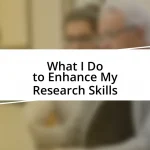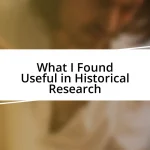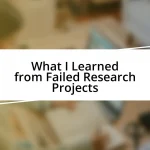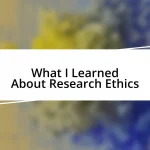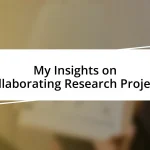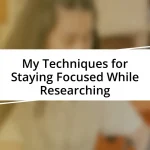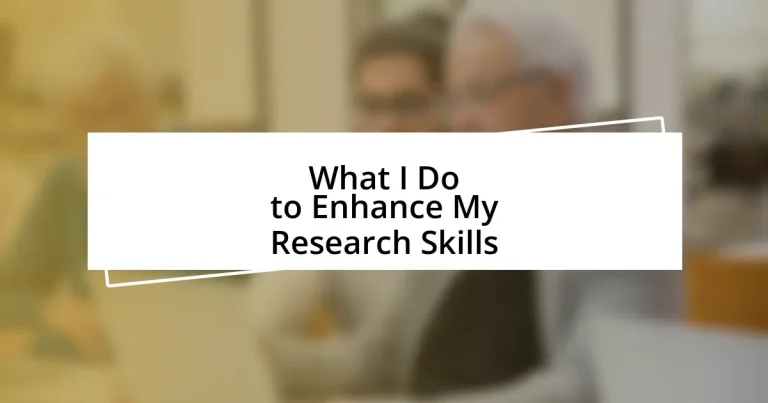Key takeaways:
- Self-assessment is crucial for identifying strengths and weaknesses in research skills and improving effectiveness.
- Utilizing academic databases, library resources, and recommendations from peers enhances access to quality information and diverse perspectives.
- Developing targeted search strategies and practicing critical analysis techniques strengthens research outcomes and analytical skills.
- Setting and revisiting personal research goals fosters focus, motivation, and adaptability in the research process.
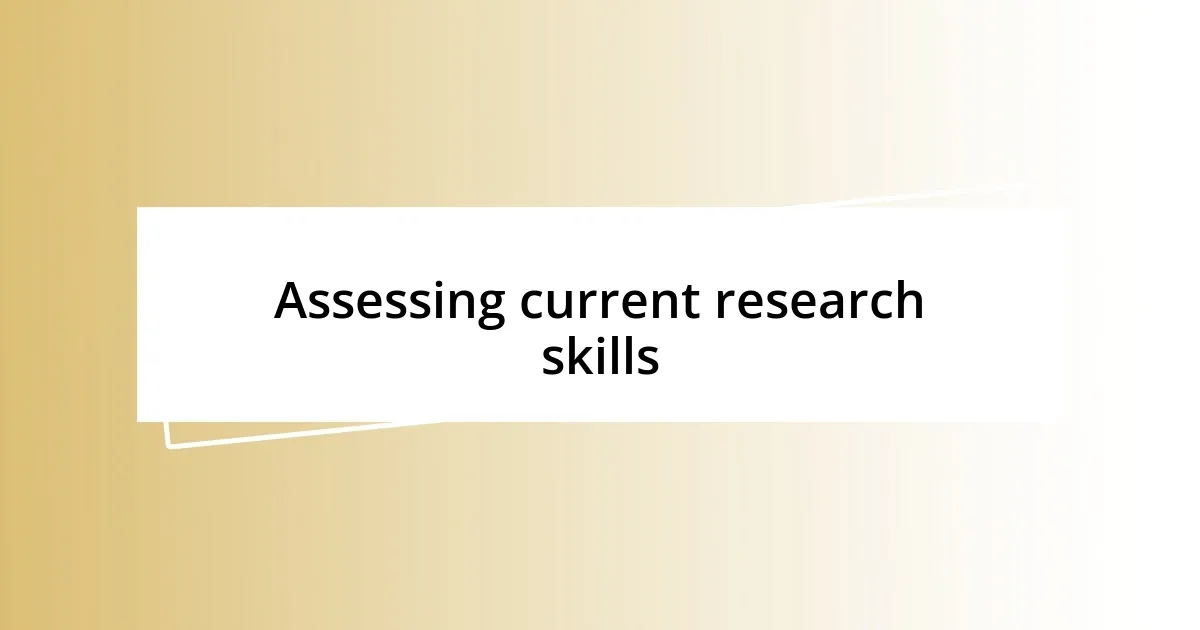
Assessing current research skills
Assessing my current research skills is like holding a mirror to my academic competencies. I recall a time when I struggled to find credible sources for a paper. It was frustrating! This experience pushed me to evaluate my skills honestly. Am I really using the right tools?
I have learned that self-assessment is essential in this process. I often jot down my strengths and weaknesses when it comes to research techniques. For instance, I pride myself on finding unique angles to explore, but I sometimes miss the mark when it comes to organizing my sources effectively. Have you ever felt that disconnect between your thought process and your resource management?
Regularly revisiting my previous research projects helps me analyze where I can improve. I remember reflecting on a particular project where my argument was solid, but my evidence fell flat. It’s moments like these that drive me to seek out new methods and tools, ensuring I’m on the right path to becoming a more skilled researcher. How do you track your growth in research skills?
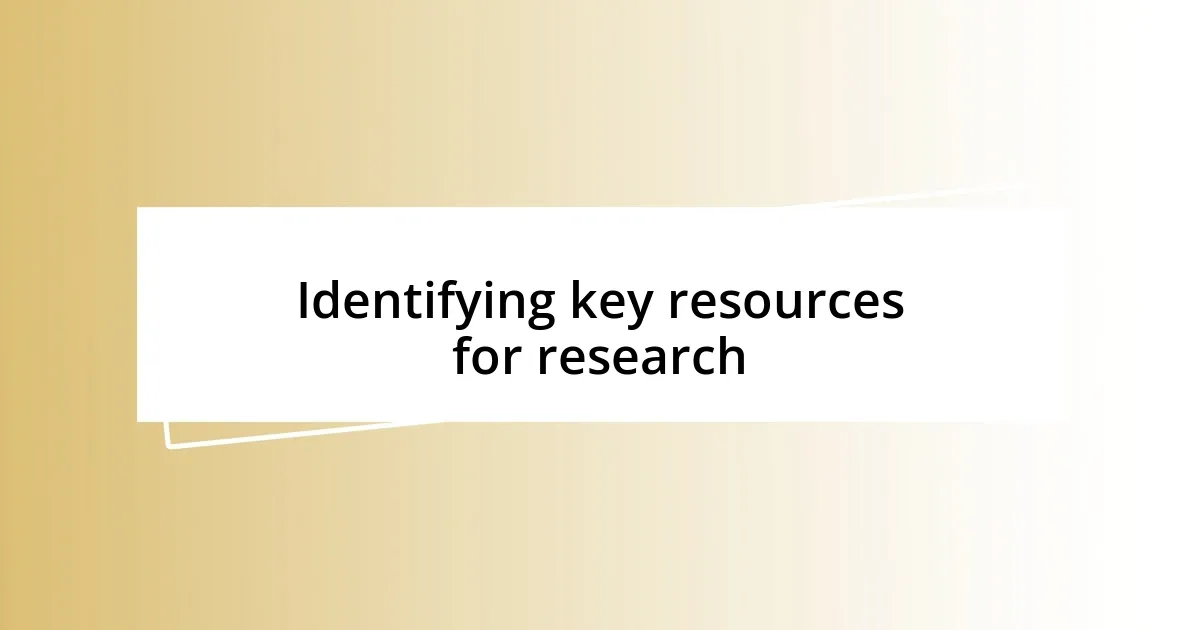
Identifying key resources for research
Identifying key resources for research can feel daunting, but I’ve found that breaking it down into categories helps. I typically start with academic databases like JSTOR and Google Scholar. One memorable moment was when I stumbled upon a study that tied directly into my thesis; it felt like striking gold! It made me realize the importance of not just looking for sources, but also knowing where to dig.
Utilizing library resources has been a game changer for me. I recall a time when I stood at the reference desk, hesitant to ask for help. Once I did, the librarian unveiled a treasure trove of specialized journals and archives I hadn’t even considered. Their expertise added layers to my research that I didn’t know I was missing. It’s amazing how a simple question can open doors to knowledge that’s not readily visible online.
I often make a list of recommended books and articles from my professors and peers. This practice feels rewarding, almost like a collaborative effort in my academic journey. One of my professors advised me to read a specific book outside my field of study, and it transformed my perspective on my research topic. I learned that diverse sources can spark unexpected ideas and contribute to richer research outcomes.
| Resource Type | Example |
|---|---|
| Academic Databases | JSTOR, Google Scholar |
| Library Resources | Specialized Journals |
| Recommended Readings | Professors’ Suggestions |
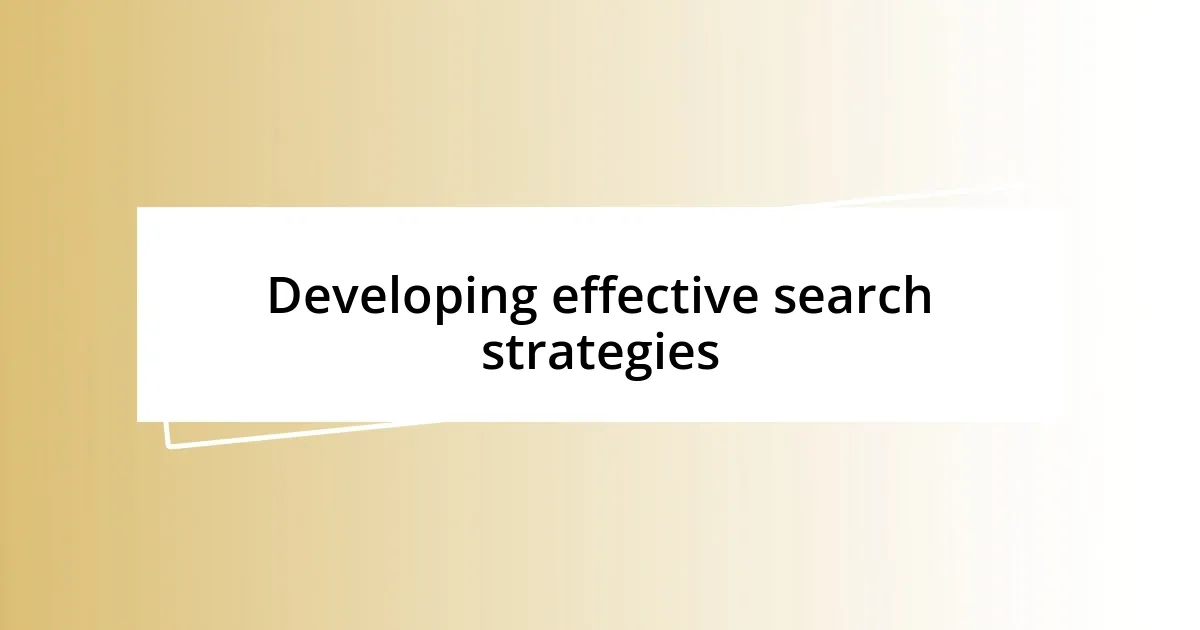
Developing effective search strategies

Developing effective search strategies
When I first started tackling research projects, I often found myself overwhelmed by the sheer volume of information. I vividly remember the early days of combing through search results that felt like an endless maze. It taught me the importance of having a clear strategy. Now, I approach every search with a specific plan in mind, using keywords wisely to filter out the noise and hone in on relevant material. Developing a focused search strategy feels empowering; it gives me control over the narrative I want to craft.
Creating a list of targeted keywords is one of my go-to techniques. I take a moment to brainstorm variations and synonyms related to my topic because each word can lead me down different avenues of discovery. Here’s a quick glimpse of how I refine my search process:
- Identify main concepts and generate related keywords.
- Utilize Boolean operators (AND, OR, NOT) to narrow or expand searches.
- Experiment with advanced search options in databases to filter by publication date or resource type.
- Review and modify search strategies based on initial results; adaptability is key!
Over time, I’ve learned that maintaining a flexible mindset is crucial. There are days when a particular strategy doesn’t yield the expected results, and that’s perfectly okay! I recall a frustrating afternoon when I was stuck on a topic and couldn’t find a single relevant article. Shifting my approach and seeking out alternative sources not only salvaged my project but also opened my eyes to new perspectives. Each challenge presents a learning opportunity, and that’s a lesson in itself in the research journey.
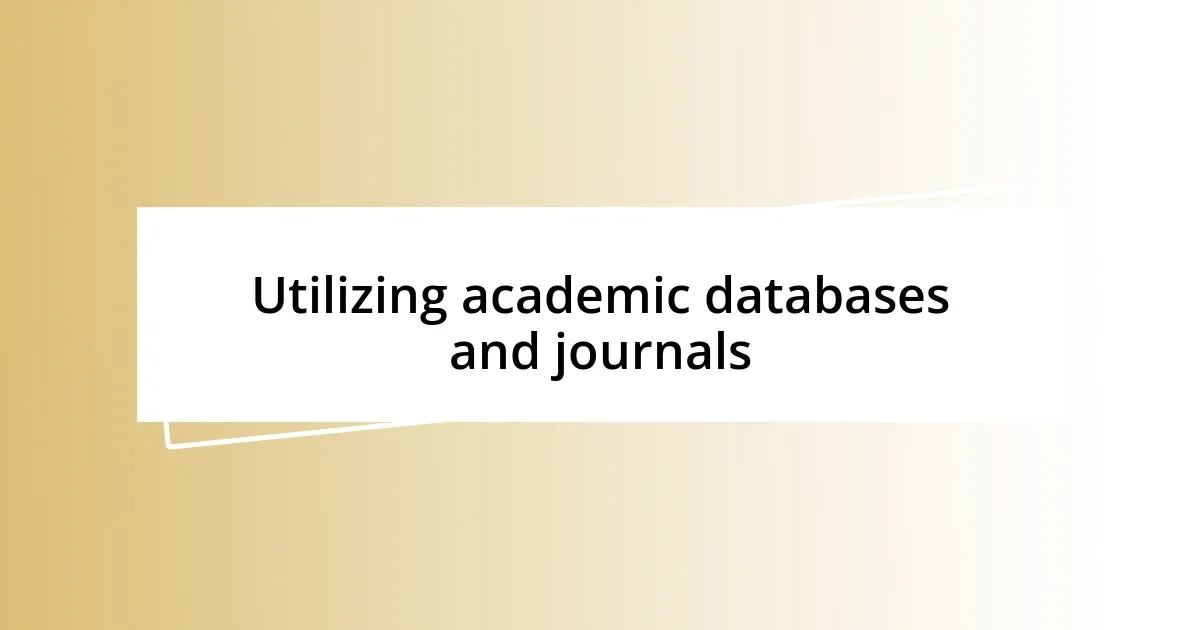
Utilizing academic databases and journals
Utilizing academic databases and journals is like having a treasure map in the vast sea of information. I vividly remember the first time I navigated JSTOR for a project. I was both excited and nervous, feeling like a kid in a candy store but unsure where to start. As I typed in my research topic, a wealth of articles appeared before me. The thrill of reading those peer-reviewed pieces was palpable; it was as if I uncovered hidden gems that enriched my understanding.
I often find myself returning to Google Scholar for a reliable overview of various disciplines. It strikes me how a simple query can lead to scholarly works that span decades. One time, I was researching a historical event, and I discovered a journal from the 1970s that not only provided context but changed the entire angle of my paper. I ask myself, “What if I hadn’t looked beyond the surface?” This inquiry emphasizes the importance of digging deeper to find sources that spark creativity and insight.
Engaging with academic journals is an ongoing learning experience. I’ve made it a habit to set aside time each week to explore new publications in my field. The anticipation of what I might find often feels like opening a Christmas gift. One of my most enriching discoveries was a recent article that challenged the conventional wisdom I held. Have you ever come across a piece that completely flipped your perspective? Those moments remind me of the dynamism of academic exploration and how vital it is to stay curious and open-minded.
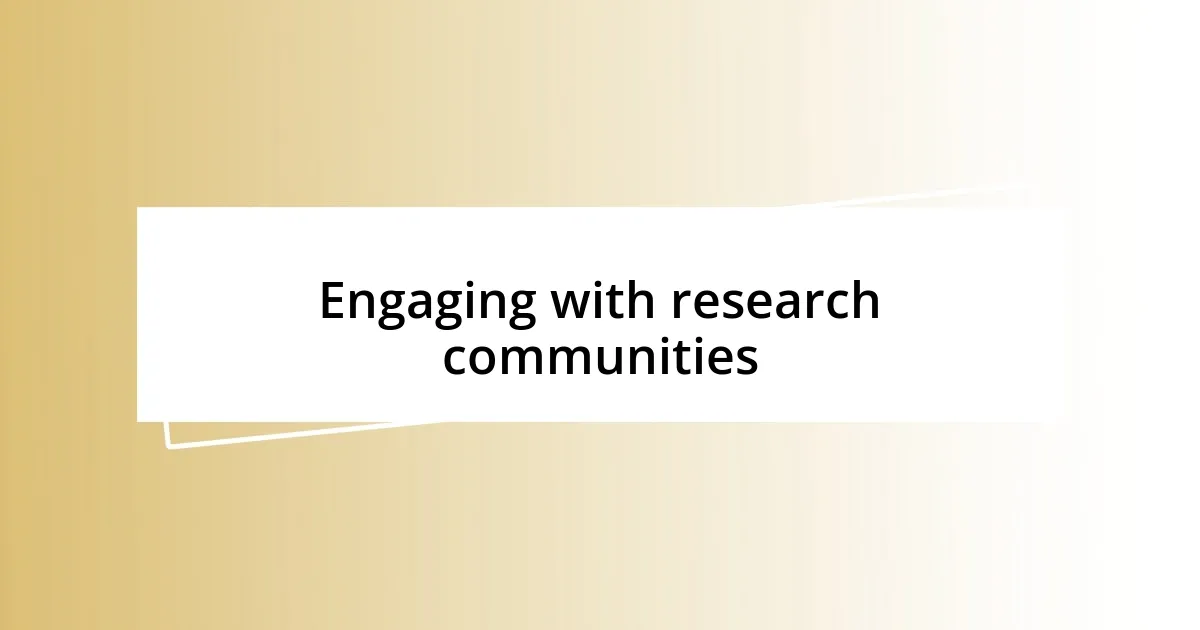
Engaging with research communities
Engaging with research communities has transformed my approach to studying. I remember attending my first academic conference and feeling both out of place and inspired. Surrounded by experts discussing their work, I realized the value of sharing ideas and connecting with others. In those moments, I learned that insights often come not just from reading but from dialogue. Have you ever had a conversation that completely shifted your understanding of a topic? That’s the kind of experience that fuels genuine curiosity and growth.
Joining online forums and social media groups related to my research interests has also been incredibly beneficial. One day, I decided to reach out to a group that focused on my niche area. I posted a question about a challenging concept, and I was amazed by the thoughtful responses that flowed in. One user even shared a resource that provided clarity and was instrumental in moving my project forward. Isn’t it fascinating how collaboration can spark new ideas? It reminds me that research isn’t just a solitary pursuit; it thrives on community and shared knowledge.
Another aspect of engaging with research communities is the opportunity for mentorship. I recall a time when I sought guidance from a seasoned researcher whose work I admired. When they agreed to meet for coffee, I felt a mix of excitement and nervousness. That conversation not only helped me refine my research questions but also made me realize the importance of seeking advice from those who have walked the path before. Have you ever thought about how mentorship could elevate your work? It’s a powerful reminder that every connection holds the potential to expand our understanding.

Practicing critical analysis techniques
Practicing critical analysis techniques is a game-changer in my research journey. I vividly remember working on a contentious topic where numerous viewpoints clashed. I challenged myself to dissect each argument, weighing the strengths and weaknesses. The process felt daunting but incredibly rewarding. I often ask, “What really makes an argument compelling?” This reflection helps me focus on evidence and reasoning, allowing for a deeper understanding of the material.
One critical analysis technique that I find invaluable is the practice of comparing sources. I recall a particularly enlightening moment while researching climate change policies. I juxtaposed two articles—one advocating for aggressive reforms and the other cautioning against hasty actions. It was intriguing to see how each author interpreted data differently, shaped by their biases. Have you experienced this kind of insight? It taught me that examining contrasting perspectives not only enriches my research but also sharpens my analytical skills.
I also immerse myself in writing analytical summaries of the articles I read. Initially, I found this exercise tedious because it felt like extra work. However, I discovered that summarizing forces me to distill complex ideas into their essence. One memorable instance was summarizing a dense theoretical piece; slowly, the main concepts crystallized, and I could discuss them confidently with my peers. It’s led me to ask, “How can I convey complex ideas simply?” Engaging with critical analysis in this way has become a vital element of my research practice.
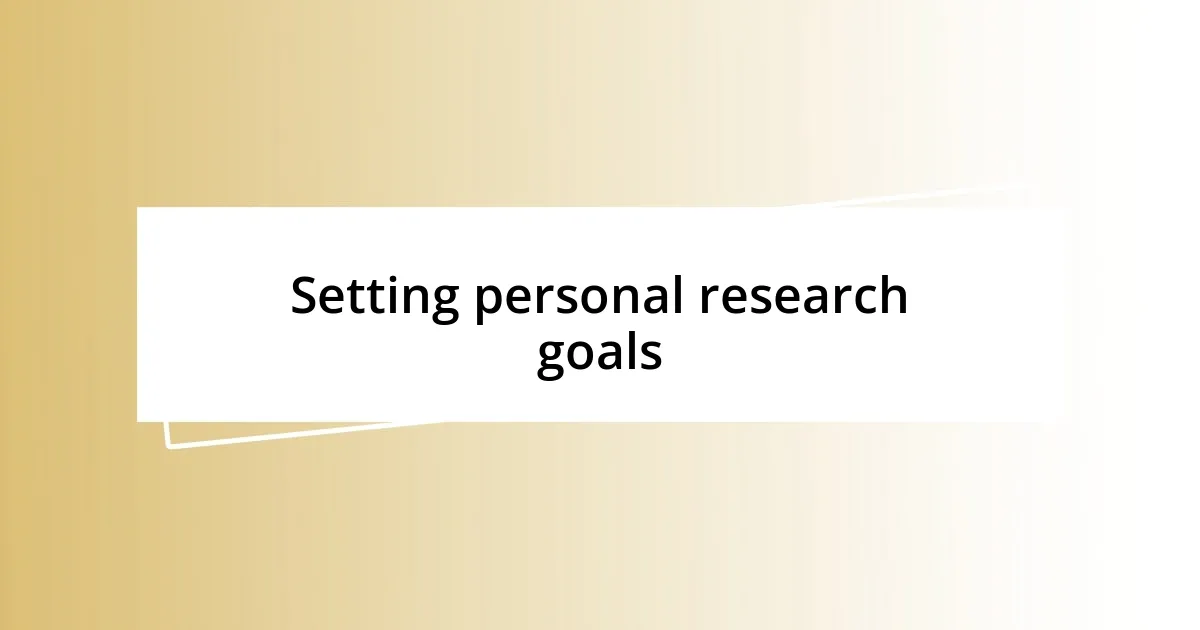
Setting personal research goals
Setting personal research goals is essential for maintaining focus and direction in my studies. One method I’ve found effective is setting SMART goals—specific, measurable, achievable, relevant, and time-bound. For instance, I once set a goal to read and analyze five academic papers in a month on a topic I was passionate about. Achieving that felt fantastic! Have you ever set a goal that pushed you beyond your comfort zone? The satisfaction of accomplishing it is truly empowering.
I also break my goals down into smaller, manageable tasks. This approach helps me avoid feeling overwhelmed. I remember tackling a large research project and dividing it into phases: literature review, data collection, and analysis. Each time I completed a phase, I celebrated that little victory. It kept me motivated and made the process enjoyable. How do you celebrate your progress? It’s those moments of acknowledgment that fuel my enthusiasm and keep the research momentum going.
Furthermore, I make it a habit to revisit and adjust my goals regularly. Life is unpredictable, and I’ve learned to embrace flexibility. For example, when I found a new area of interest, I realized I needed to pivot my research focus. I reassessed my initial goals and realigned them to fit my evolving interests. This adaptability keeps my research relevant and aligned with my passions. Have you experienced a shift in your research interests? It’s a reminder that our goals can grow and change just as we do.



